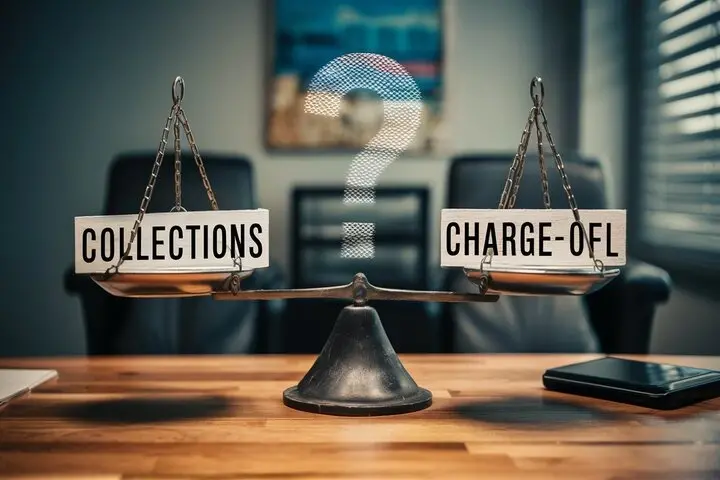-
Posted on: 23 Jul 2024

-
People always try to keep their finances on track and that involves sometimes coming face to face with realities that are not very pleasant – outstanding debts that have been sold to collection agencies or written off. Both collections and charge-offs are a big no for your credit scores, which makes one wonder whether to pay them or just ignore them as they get old. Below is the breakdown of each and how they may be handled.
What is a Collection?
A collection arises when you have been in a situation where you have defaulted on a particular obligation and the creditor company sells or transfers your balance to a collection company. The agency then seeks to be paid by you, at times with vigor or undue pressure. Collections are considered by most companies as a negative entry on your credit report whenever you open an account in a collection agency.
Remember you still have this black spot that follows you for 7 years from the time when the debt was initially unpaid even though the collection agency may not be as aggressive as before. Paying the collection, however, helps boost the credit score and the next loan chances and therefore should be done.
A Charge Off is generally understood as when a company writes off a certain amount of receivables as a loss, based on the likelihood of recovering the money.
Charge-off means that the creditor, the institution that extends the credit like a bank or credit union and so on, deems that amount non-recoverable. They write it off as a loss on their balance sheets but are still legally entitled to claim for the monies. Charge-offs also remain on your credit report for 7 years From this list, people can see that charge-offs also remain on your credit report for 7 years.
When it comes to charges offs it is common to sell them to collections agencies but this is not compulsory. If sold you will carry on dealing with the agency only. However, if your account is kept with the original creditor you would still receive direct communication asking for the balance to be paid.
Collections to Pay or Let Fall?
Collection accounts are not desirable to have on your credit report since many creditors will not extend credit to you if you have one. However, the negative impact stays for years either way in the case of a divorce. Paying collections, on the other hand, can commence improving your credit right from the time you pay the amount.
Here are some key reasons it's usually better to pay collections debts:
1. The adage of paying your debts can also help you build a better credit rating. While negative items themselves cause a decline in the credit score, the effect weakens with time. Yet, making payments to them means the credit repair process gains speed. And the good thing is that each paid collection can help you raise your credit score.
2. You reduce owed balances. It also enhances your credit score as it increases your credit utilization ratio within the shortest time possible. Let’s suppose that you carry a balance of $5,000 on the credit cards with a total limit of $10,000. That 50% ratio hurts! However, pay a $1,000 collection, and your ratio increases to 40% So you can see that a little activity goes a long way.
3. Paid collections cannot be sold again thus the need to part with some cash and acquire the collection. Collections agencies also have the option of selling overdue debts to other agencies which means going round in circles. Pay them, and it’s one less creditor to pay off and haggle with.
4. You may haggle and pay even a lesser amount. It is advisable to pay one full amount because collectors usually agree to take a lesser amount. For instance, a $500 collection may be paid with $300.
5. Unlike other valuables that may require some amount of time before they are deemed useless, debts are considered useless after they have been paid off. An unpaid collection comes off your credit file after 7 years from the first missed payment. But if you pay, the 7 years is as of the time it was paid. The clock is wiped to enable one to reclaim his/her credit reputation faster.
But should you pay charge-offs?
With charge-offs, creditors give up and cease all attempts at collecting on the debt. They can still be able to sell the bad debt to collectors on the same basis. Dealing with a charge is possible before that happens, and paying it off will help to avoid further harm. Here are some pros for paying charge-offs:
• Regarding payments, like in collections, payment arrangements are commonly welcomed. It may be possible to pay as low as 50-70% of the total amount you owe.
• This in turn may help to prevent future legal action. By paying, the creditor has less incentive to sue or further assign the debt since a portion of the amount owed to him has been settled.
• It helps to protect the credit record from the sale of the debt to collections and its return to the same.
Nevertheless, if you pay an old charge, it clears that particular charge from your credit history. While it can help build credit history, this can increase your credit utilization ratio in the short term. Let’s say you have 10k on a total in credit cards which have a limit of $20,000. That's 50% usage. If you have a charge of $3,000 then once you pay it off you are left with $7,000. But your limit also falls to 17500. The rate is still fair enough but now your usage has skyrocketed to over 41%.
Before paying, ask yourself if the charge-off is fresh enough that this rate of deduction will be significant. Remember to analyze the payment benefits against the credit impacts concerning your particular case.
Management of Countries and Charge Offs
Ideally, the idea is to bring the balances down to zero on collection and charge-off accounts to boost the credit scores. If money is tight, here are some options to consider:
• Get collectors and creditors to agree to take one-time lump-sum settlements at lower rates than you would have paid monthly. Most of them take up to 70% or less on their old debts.
• If lump-sum payments are not negotiable, establish small monthly payments instead. Ensure that the payment aspects and terms are spelled out in writing as and when it is required.
• Target newer debts over the older ones when it comes to payment since it is easier to solve the new ones. Offering fresh items contributes towards credit repair much faster because the items offered are new and as such, their removal from the credit report has a positive impact.
• Think about debt management plans provided by credit counseling agencies that involve paying different creditors/collectors every month. They can also discuss rates or terms of service with the relevant providers on your behalf.
• In the last instance, one should save to pay off collection accounts on the credit reports before these accounts drop out of the credit reporting system after 7 years. Under this type of ranking, old debts are not paid first, but rather, the debts that have been reported most recently are paid first.
The Bottom Line
It is not a good way to live when you have unpaid collections or charge-offs that pull your credit score for years. To pay them – even a part of the amount – can become a great comfort and help to protect them from possible negative consequences. Once again, merely ensure that you drive the prices so low, and secure all agreements on handling the settlement in writing initially. That is why, with a wise repayment plan, you will increase your scores and regain credit.
Need better credit? Call (888) 803-7889 and let the experts help you!




